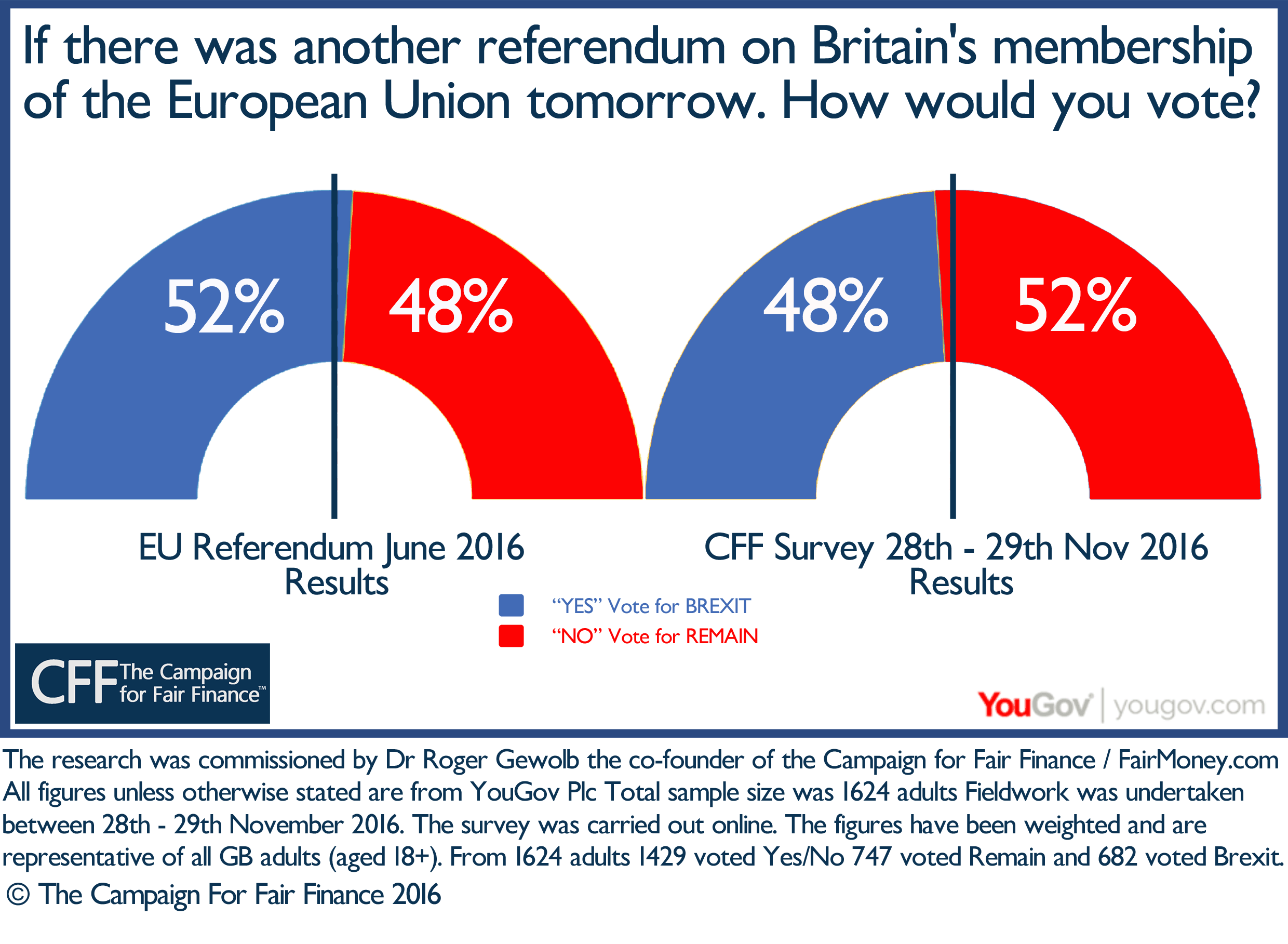Does the UK still want Brexit?
New poll REVERSES referendum result.
Fewer of us would vote to leave the EU if given a second chance according to YouGov research commissioned by the financial entrepreneur and co-founder of FairMoney™ Dr Roger Gewolb.
The research was also carried out on behalf of the Campaign for Fair Finance™, of which Dr Gewolb is also the founder and chair. The Campaign for Fair Finance seeks to build consensus among stakeholders in the financial services and FinTec (financial technology) sectors, and whose recent campaigns include reaching a fair compromise on interest rates charged by payday loan companies and calling for tighter supervision to further the success of the rapidly expanding peer-to-peer lending market.
The poll shows the scales have tipped in favour of remain – but it’s a divided picture with only 6% separating the two camps.
As with June’s national referendum, the research asked just one question: “If there was another referendum on Britain's membership of the European Union tomorrow, how would you vote?”
42% now say they want to leave the EU compared with 52% in the referendum ballot box.
Remain was also down slightly at 46% compared with 48% in June.
6% said they wouldn’t vote at all in a rerun and a further 6% didn’t know.
And the result is even more revealing when the ‘don’t know/won’t vote’ numbers are excluded. This REVERSES the outcome of the referendum, with 52% now saying they’d prefer to remain and 48% wanting to leave.
The margin of error in polls of this nature is typically around 3%.

Dr Gewolb, a British American who has run finance companies across Europe and is now based in the UK, commissioned the research following Donald Trump's election as the next US president:
“Trump’s election changes the dynamic. Bilateral trading arrangements between individual countries are back on the table and the UK is in a strong position to negotiate a beneficial deal with the United States.
“We could not have predicted Trump’s victory at the time of our referendum, but it transpires that voting out has given us a huge advantage over the clunking twenty-seven country economy that is the EU. UK plc has emerged nimble footed and on precisely the right square on the international chessboard, ready, willing and able to negotiate country-by-country deals with the US and others who will want to do business with us. And in contrast to President Obama, we’re not at the back of the Donald’s queue.”
But Dr Gewolb counsels against the negative dialogue around Brexit:
“British business, the beating heart of our nation, has the collywobbles because so many people are making mischief and creating confusion and scare around both sides of the referendum result,” says Dr Gewolb.
“We don’t even have Brexit yet, but already we’re talking ourselves into bad news. In my view, there is far more to fear from the downbeat dialogue than from Brexit itself. The sniping from both sides is hurting our economy and could send it into a limbo from which it will take years to recover."
A former London merchant banker, the US-born entrepreneur and lawyer was an FM radio host in Chicago before moving to France. He ran a group of financial companies across Europe and was also the chief executive of Europe's largest independent film studio before moving his business interests to the UK in the '80s where he has spent many years in the city.
“The findings of this research are fascinating. If you listen to the pundits on chat shows and ‘phone-ins, you’d think we’d already fallen out of love with Brexit, but the truth is a more confusing picture which the ‘don’t knows’ and ‘wouldn’t votes’ could tip either way. I personally voted to remain, because, as a businessman, I wanted to avoid the inevitable period of uncertainty which we’re now in. But we are where we are and I’m entirely relaxed about that because the Brits are among the most supple and resilient business players in the world - that’s why I’ve moved my business interests here. UK plc was always going to make a success of this thing whatever the outcome of the referendum. But we must stop the negative rhetoric, whatever side you’re on - it is damaging and hurts business, and that hurts all of our pockets in the end.”


